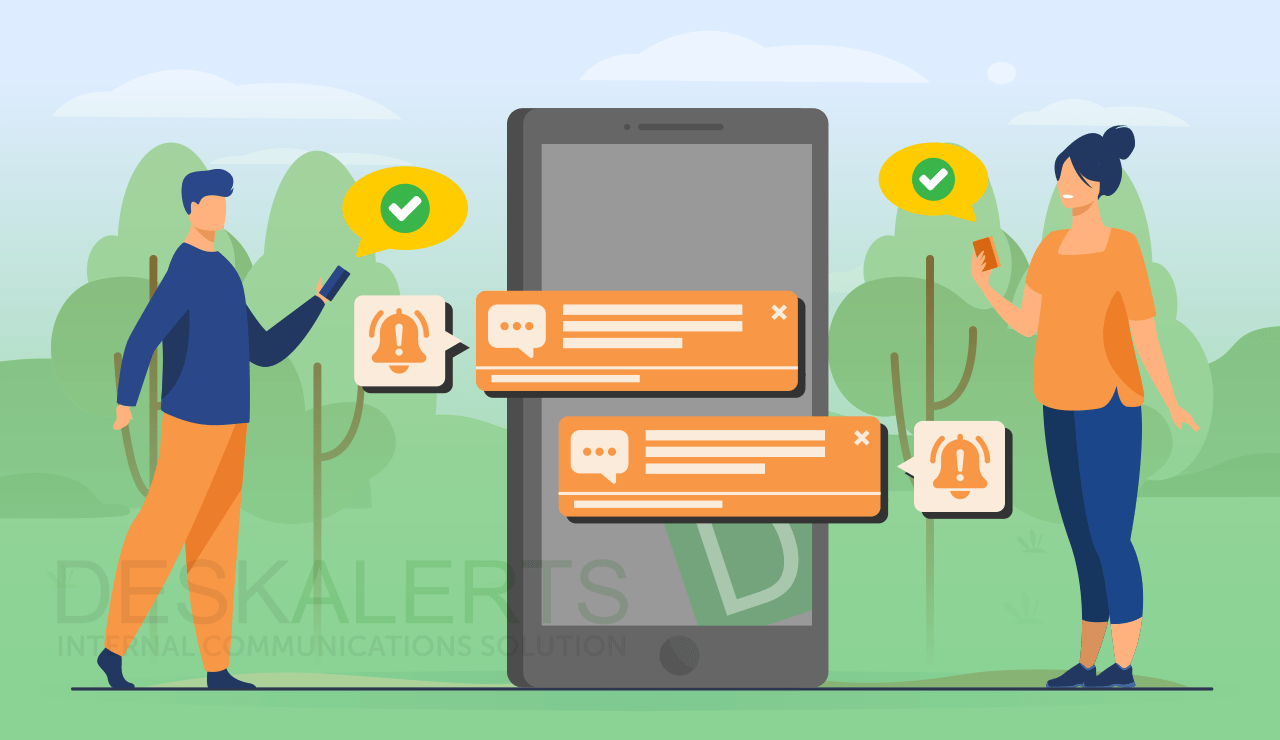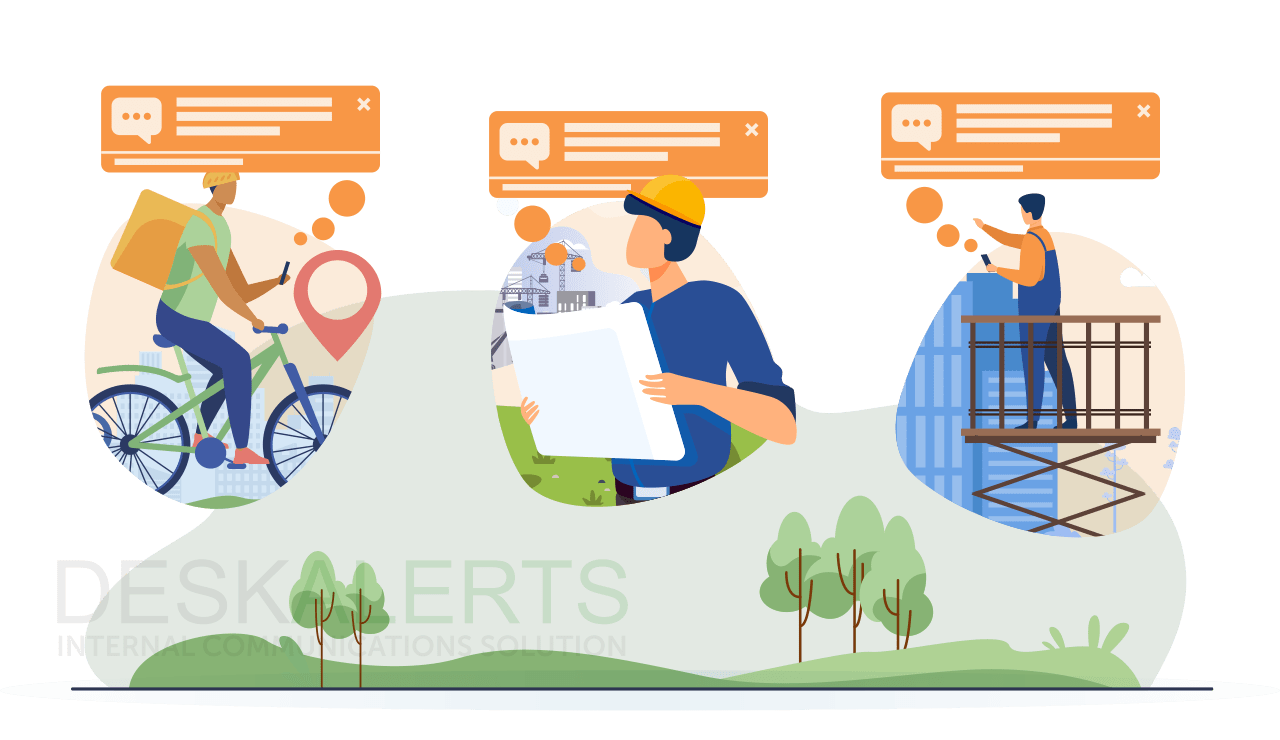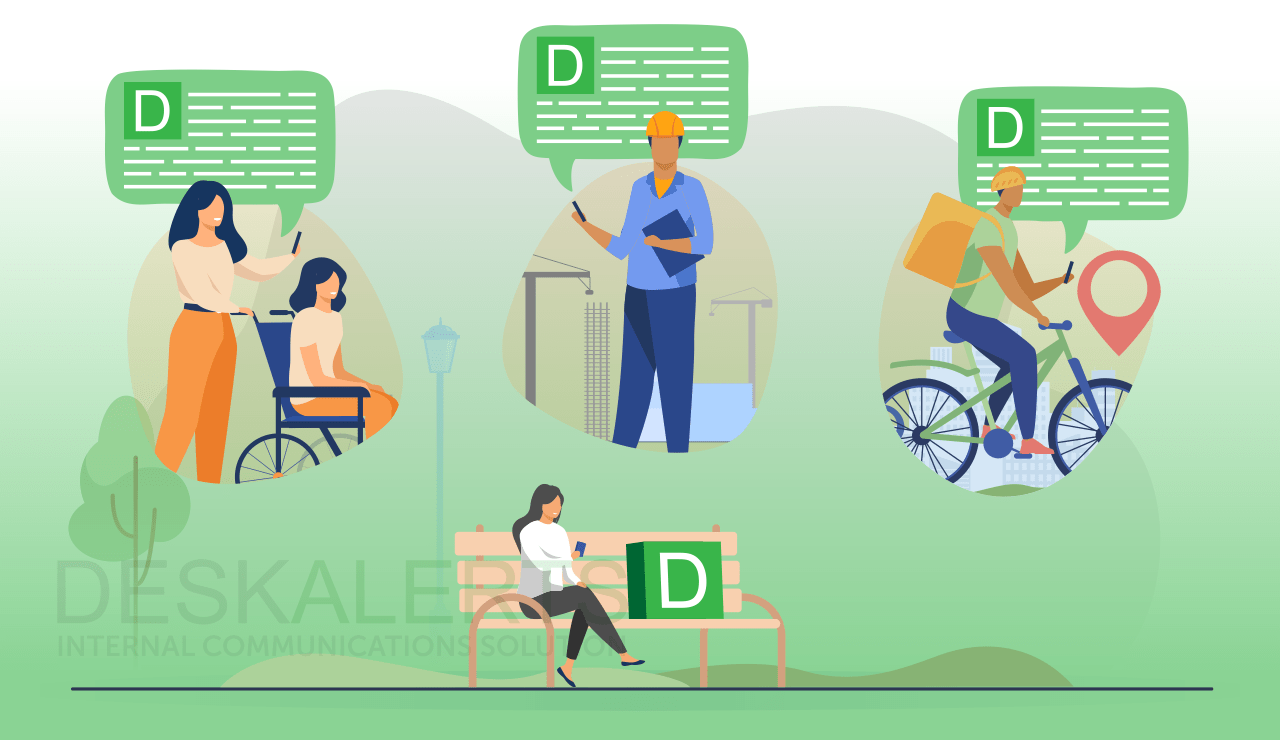13 min read
Top Internal Communication Trends in 2025 and How Businesses Are Adapting [+ Examples]
Historically, internal communication tracked engagement metrics like email open rates, clicks, or survey participation. However, in 2025, the focus...

Despite the benefits of modern technologies, the problem of staying connected is still increasingly crucial, particularly for those who work on the go. Mobile workers and field workforce face limitations with traditional communication methods like phone calls or emails, as they may need access to a computer or be able to answer calls. This can lead to missed messages, delayed responses, and a lack of communication between team members. However, SMS notification systems remain an effective way of staying connected on the go, even in remote areas. With the ability to send and receive messages instantly on mobile devices, SMS notifications can improve communication and productivity for those outside of traditional office settings.
DeskAlerts' SMS notification system is designed to address the unique needs of mobile workers and the field workforce. Its customizable and user-friendly interface allows for the quick and efficient delivery of messages, whether for important updates or emergencies.
In this article, we will explore the benefits of SMS notification systems for mobile workers and field workforce and how DeskAlerts' solution can help teams stay connected on the go. We will also provide helpful tips for maximizing the benefits of SMS notifications in these settings.
Table of contents
Comparing SMS and Mobile App Notifications
The Need for SMS Notification Systems for Those on the Go
What is DeskAlerts' SMS Notification System?
What are the benefits of using DeskAlerts' SMS notifications for mobile workers?
What are the Challenges and Considerations in Implementing SMS Notification Systems?
Useful Tips for Maximizing the Benefits of SMS Notification Systems
SMS notifications are generally faster than mobile app notifications because they do not require an internet connection to deliver the message. Mobile app notifications rely on an internet connection, which can be slower in areas with poor connectivity.
SMS notifications have a higher reliability rate than mobile app notifications. SMS messages are more likely to be delivered even in areas with poor connectivity or network outages. On the other hand, mobile app notifications can experience delays or fail to send altogether due to connectivity issues.
SMS notifications are more accessible than mobile app notifications because they do not require the installation of a specific app. SMS messages can be received on any mobile device with text messaging capabilities, whereas mobile app notifications are limited to devices with the specific app installed.
SMS notifications have minimal impact on battery life compared to mobile app notifications, which require active background processes and internet connectivity to receive and deliver notifications. SMS notifications consume significantly less battery power and are more energy-efficient.
In situations where employees are working in remote areas with limited or no internet connectivity, SMS notifications can be a lifesaver. For instance, imagine a field worker stranded in a desert with no access to the internet but a working mobile phone. In such a scenario, an SMS notification can be the only means of communication to reach the employee quickly and ensure their safety.

Mobile workers and field workforce in various industries face unique risks and challenges, which can result in severe consequences without effective communication tools. Here are some examples of how delayed or ineffective communication can impact different industries:
In these and many other industries, reliable and efficient communication systems are essential to ensure the safety of workers and the success of the business.
>> Read this article to learn about Mobile Workforce Management <<
DeskAlerts' SMS notification system is a powerful and efficient tool that can revolutionize communication for mobile workers and field workforce across various industries. Here are some of the ways in which DeskAlerts' SMS notifications can improve communication for these workers:
In emergency situations, every second counts. DeskAlerts' SMS notifications can be used to send emergency notifications and safety alerts to mobile workers and field workforce in real time, helping them to respond quickly and take necessary action to ensure their safety. For example, companies use our SMS module to notify their workers about severe weather conditions in remote locations.
Mobile workers and field workforce often face changing schedules and tasks. DeskAlerts' SMS notifications can be used to send real-time updates and task assignments, ensuring that workers are always aware of their schedules and responsibilities.
DeskAlerts' SMS notifications can also be used to send schedule changes and shift updates to mobile workers and field workforce, helping to ensure that they are always up-to-date with their work schedules.
The DeskAlerts SMS notification system does not work independently. It needs to connect to an SMS gateway service provider through an API. Organizations that want to implement DeskAlerts SMS notifications must have an existing SMS gateway service provider and pay for its service. We are ready to recommend the best-in-class if you don't have any.
Implementing SMS notification systems can present some challenges for organizations. Some of the challenges that organizations may face include cost and resource constraints for equipping workers with mobile devices, privacy and security concerns for sensitive communication, and user adoption and engagement for workers who may be resistant to change.
To address these challenges, organizations should consider the following tips:
Organizations should establish clear policies and procedures for the collection, storage, and transmission of sensitive information. They should also ensure that the SMS notification system complies with relevant regulations and standards.
To encourage user adoption and engagement, organizations should communicate the benefits of the SMS notification system to workers. Emphasize how the system will improve communication and enhance safety, productivity, and overall job satisfaction.
Organizations should provide adequate training and support for workers to ensure they are comfortable with the new system. This may include training on how to use the system, troubleshooting common issues, and providing ongoing support as needed.
Organizations should continually evaluate the effectiveness of the SMS notification system and make necessary refinements. This may include monitoring system usage and performance, soliciting feedback from workers, and identifying areas for improvement.
However, more than simply implementing an SMS notification system is required. To maximize its benefits, it's essential to ensure that your employees are using it correctly and efficiently. Here are some useful tips for workers to get the most out of their organization's SMS notification system:
Mobile devices should be regularly checked for notifications and updated to ensure the SMS notification system works effectively.
Workers should provide feedback and suggestions to their IT department about improving the SMS notification system to better suit their needs and improve overall communication.
Participating in training sessions to learn about new features and best practices for using the SMS notification system can significantly improve worker engagement and ensure the system's success.
Workers' engagement and participation are crucial for the success of SMS notification systems. Workers should actively engage with the system and provide feedback to ensure that it meets their needs and effectively improves communication and productivity.
***
In conclusion, SMS notification systems provide numerous benefits for all kinds of notifications, particularly for that outside of traditional office settings. Implementing a reliable and efficient notification system should be a priority for organizations to ensure effective communication, productivity, and safety of their workers.
Take the first step towards better communication and productivity on the go. Contact DeskAlerts today to learn more about our SMS notification system.
![Top Internal Communication Trends in 2025 and How Businesses Are Adapting [+ Examples]](https://www.alert-software.com/hubfs/Top%20Internal%20Communication%20Trends%20in%202025.png)
13 min read
Historically, internal communication tracked engagement metrics like email open rates, clicks, or survey participation. However, in 2025, the focus...

14 min read
You could have the best communication strategy for change management, the right tools, and a clear business case, but if your employees don’t...

14 min read
Martyn’s Law will change how UK venues prepare for terrorist threats as it requires businesses to take proactive security measures to protect the...

6 min read
Management software for mobile workers is vital so that everyone in a company, no matter where they are, can be messaged or alerted when necessary. ...